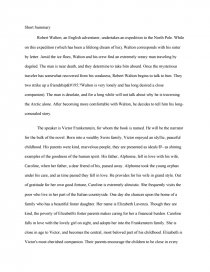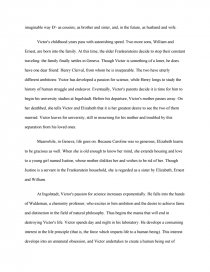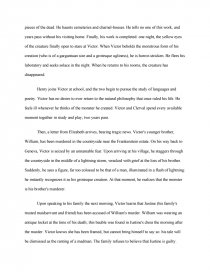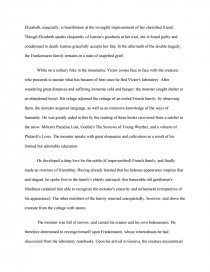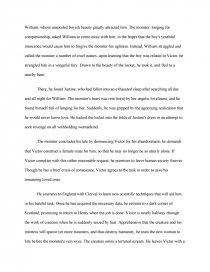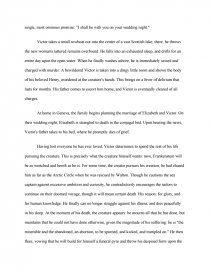Short Summary Frankenstein Mary Shiley
Essay by review • February 26, 2011 • Essay • 1,927 Words (8 Pages) • 3,205 Views
Short Summary
Robert Walton, an English adventurer, undertakes an expedition to the North Pole. While on this expedition (which has been a lifelong dream of his), Walton corresponds with his sister by letter. Amid the ice floes, Walton and his crew find an extremely weary man traveling by dogsled. The man is near death, and they determine to take him aboard. Once the mysterious traveler has somewhat recovered from his weakness, Robert Walton begins to talk to him. They two strike up a friendshipÃ?Walton is very lonely and has long desired a close companion). The man is desolate, and for a long while will not talk about why he is traversing the Arctic alone. After becoming more comfortable with Walton, he decides to tell him his long-concealed story.
The speaker is Victor Frankenstein, for whom the book is named. He will be the narrator for the bulk of the novel. Born into a wealthy Swiss family, Victor enjoyed an idyllic, peaceful childhood. His parents were kind, marvelous people; they are presented as ideals Ð' as shining examples of the goodness of the human spirit. His father, Alphonse, fell in love with his wife, Caroline, when her father, a dear friend of his, passed away. Alphonse took the young orphan under his care, and as time passed they fell in love. He provides for his wife in grand style. Out of gratitude for her own good fortune, Caroline is extremely altruistic. She frequently visits the poor who live in her part of the Italian countryside. One day she chances upon the home of a family who has a beautiful foster daughter. Her name is Elizabeth Lavenza. Though they are kind, the poverty of Elizabeth's foster parents makes caring for her a financial burden. Caroline falls in love with the lovely girl on sight, and adopts her into the Frankenstein family. She is close in age to Victor, and becomes the central, most beloved part of his childhood. Elizabeth is Victor's most cherished companion. Their parents encourage the children to be close in every imaginable way Ð' as cousins, as brother and sister, and, in the future, as husband and wife.
Victor's childhood years pass with astonishing speed. Two more sons, William and Ernest, are born into the family. At this time, the elder Frankensteins decide to stop their constant traveling: the family finally settles in Geneva. Though Victor is something of a loner, he does have one dear friend: Henry Clerval, from whom he is inseparable. The two have utterly different ambitions: Victor has developed a passion for science, while Henry longs to study the history of human struggle and endeavor. Eventually, Victor's parents decide it is time for him to begin his university studies at Ingolstadt. Before his departure, Victor's mother passes away. On her deathbed, she tells Victor and Elizabeth that it is her greatest desire to see the two of them married. Victor leaves for university, still in mourning for his mother and troubled by this separation from his loved ones.
Meanwhile, in Geneva, life goes on. Because Caroline was so generous, Elizabeth learns to be gracious as well. When she is old enough to know her mind, she extends housing and love to a young girl named Justine, whose mother dislikes her and wishes to be rid of her. Though Justine is a servant in the Frankenstein household, she is regarded as a sister by Elizabeth, Ernest and William.
At Ingolstadt, Victor's passion for science increases exponentially. He falls into the hands of Waldeman, a chemistry professor, who excites in him ambition and the desire to achieve fame and distinction in the field of natural philosophy. Thus begins the mania that will end in destroying Victor's life. Victor spends day and night in his laboratory. He develops a consuming interest in the life principle (that is, the force which imparts life to a human being). This interest develops into an unnatural obsession, and Victor undertakes to create a human being out of pieces of the dead. He haunts cemeteries and charnel-houses. He tells no one of this work, and years pass without his visiting home. Finally, his work is completed: one night, the yellow eyes of the creature finally open to stare at Victor. When Victor beholds the monstrous form of his creation (who is of a gargantuan size and a grotesque ugliness), he is horror-stricken. He flees his laboratory and seeks solace in the night. When he returns to his rooms, the creature has disappeared.
Henry joins Victor at school, and the two begin to pursue the study of languages and poetry. Victor has no desire to ever return to the natural philosophy that once ruled his life. He feels ill whenever he thinks of the monster he created. Victor and Clerval spend every available moment together in study and play; two years pass.
Then, a letter from Elizabeth arrives, bearing tragic news. Victor's younger brother, William, has been murdered in the countryside near the Frankenstein estate. On his way back to Geneva, Victor is seized by an unnamable fear. Upon arriving at his village, he staggers through the countryside in the middle of a lightning storm, wracked with grief at the loss of his brother. Suddenly, he sees a figure, far too colossal to be that of a man, illuminated in a flash of lightning: he instantly recognizes it as his grotesque creation. At that moment, he realizes that the monster is his brother's murderer.
Upon speaking to his family the next morning, Victor learns that Justine (his family's trusted maidservant and friend) has been accused of William's murder. William was wearing an antique locket at the time of his death; this bauble was found in Justine's dress the morning after the murder. Victor knows she has been framed, but cannot bring himself to say so: his tale will be dismissed as the ranting of a madman. The family refuses to believe that Justine is guilty. Elizabeth, especially, is heartbroken at the wrongful imprisonment of her cherished friend. Though Elizabeth speaks eloquently of Justine's goodness at her trial, she is found guilty and condemned to death. Justine gracefully accepts her fate. In the aftermath of the double tragedy, the Frankenstein family remains in a state of stupefied grief.
While on a solitary hike in the mountains, Victor comes face to face with the creature, who proceeds to narrate what has became of him since he fled Victor's laboratory. After wandering great distances and suffering immense cold and hunger, the monster sought shelter in an abandoned hovel. His refuge adjoined the cottage of an exiled French family: by observing them, the monster acquired language, as well as an extensive knowledge of the ways of humanity. He was greatly aided in this by the reading of three books recovered from a satchel
...
...
